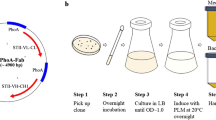Recombinant E. coli clones expressing a 50-kDa poly-histidine tail tagged antibody fragment against botulinum toxin (bt-Fab) were initially screened for yield and binding affinity. One clone was selected for bioprocess development. The selected bt-Fab vector was induced by addition of IPTG and the protein was targeted to the periplasm by inclusion of a pelB leader sequence. A histidine6 affinity ligand at the heavy chain C-terminus facilitated single-step purification by immobilized metal-affinity chromatography (IMAC). Notably, the effects of post-induction temperature on bt-Fab expression and downstream purification were evaluated. Our results demonstrated that fermentation conditions interfered with purification on the IMAC column at 37°C. Protease analysis by gelatin polyacrylamide gel electrophoresis (GPAGE) indicated the presence of a membrane-bound ∼39 kDa protease activity shortly after induction. The appearance of the protease activity was inversely correlated with the bt-Fab yield. The protease was purified and was shown to degrade bt-Fab. A simple kinetic model was developed describing temporal regulation of protease and bt-Fab degradation. Partially degraded bt-Fab was unrecoverable by IMAC, presumably due to the loss of the His6 affinity ligand. The amount of purified bt-Fab obtained per liter of fermentation broth was typically ∼1 mg.
Similar content being viewed by others
Author information
Authors and Affiliations
Additional information
Received 18 August 1997/ Accepted in revised form 4 October 1998
Rights and permissions
About this article
Cite this article
Bentley, W., Madurawe, R., Gill, R. et al. Generation of a histidine-tagged antibotulinum toxin antibody fragment in E. coli: effects of post-induction temperature on yield and IMAC binding-affinity. J Ind Microbiol Biotech 21, 275–282 (1998). https://doi.org/10.1038/sj.jim.2900577
Issue Date:
DOI: https://doi.org/10.1038/sj.jim.2900577




